University of Notre Dame forms partnership with Vatican library
The University of Notre Dame has entered into a five-year partnership with the Vatican Library that will provide Notre Dame students and faculty access to books and resources held in the Vatican collection.
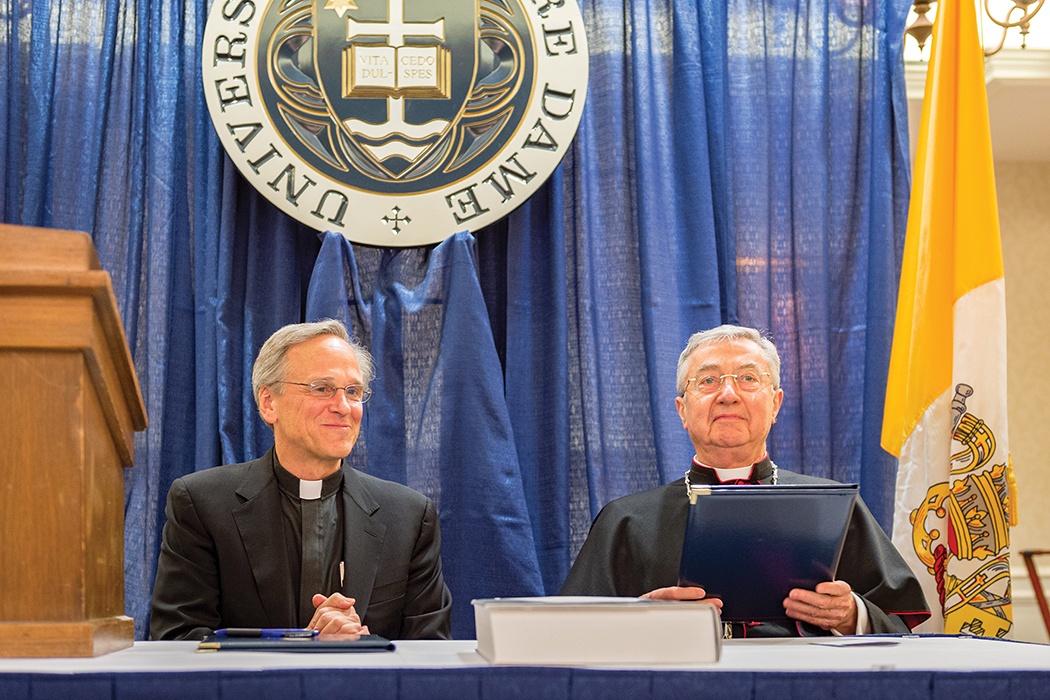 |
The University of Notre Dame and the Vatican Library formalized an agreement of collaboration and exchange in a ceremony on May 9.
Left: Notre Dame president Father John I. Jenkins, C.S.C. Right: Archbishop Jean-Louis Bruguès, O.P., Vatican archivist and librarian.
Credit: Matt Cashore/University of Notre Dame |
The partnership, the first of its kind between the Vatican and a North American institution of higher education, will also include collaborative research projects and joint conferences.
The partnership was formally announced at the Promise of the Vatican Library, a conference at Notre Dame that featured an exhibition of manuscripts from the Vatican Library. During the conference, the university president, Father John I. Jenkins, and the Vatican archivist, Archbishop Jean-Louis Bruguès, signed a memorandum of understanding.
The Vatican’s holdings include over 80,000 manuscripts. They are using this agreement, along with digitization projects with other institutions, to make their resources more accessible to scholars internationally.
Seminary graduate competes on American Ninja Warrior
 |
Sean Bryan
Credit: Christopher Silva |
Sean Bryan, a graduate of the Dominican School of Philosophy and Theology, is known as the Papal Ninja on TV. He recently finished competing on an obstacle course competition show, “American Ninja Warrior,” which airs nationally on NBC.
A former gymnast at the University of California, Berkeley, Bryan spent time after graduation discerning a possible vocation with the Salesians, a religious order founded by St. John Bosco. He earned a master’s degree with a concentration in Salesian studies from the Dominican School of Philosophy and Theology, and he still resides with the Salesians in Berkeley, where he serves as administrative assistant at the Institute of Salesian Studies. He also works as the animating director of the Lay Mission Project, a work of the Western Dominican Province in collaboration with dioceses on spiritual and vocational formation for lay people.
Bryan was taken out by an obstacle in the show’s regional finals in Los Angeles, but in a statement on his Facebook page, he says that he will continue training and hopes to be selected again next year. Meanwhile, his Facebook fan page says he’s working to “animate the sleeping giant of Catholic laity.”
College/seminary is considering splitting into two
Erskine College in Due West, South Carolina, a primarily undergraduate institution that includes Erskine Theological Seminary as a graduate division, is considering dividing into separate institutions. This past spring, the school’s board of trustees created an ad hoc committee to explore strategies, including the possibility of separating the seminary into its own entity. More recently, the General Synod of the Associate Reformed Presbyterian Church, which governs the college, voted in support of exploring the possibility of two separate institutions.
In 2014, Erskine was put on probation by its regional accrediting body, the Southern Association of Colleges and Schools, due to financial concerns. In response, administrators cut the budget by $2 million, reducing faculty salaries and retirement benefits.
Erskine was removed from probation in 2015, but seminary faculty later submitted a petition to the board claiming that budget cuts hit the seminary at a higher rate than the college and asking that the board consider spinning off the seminary to become a separate institution.
The church’s General Synod has moved all of its financial backing to the seminary — a change from past practices, when 60 percent of the General Synod’s funding went to the college and 40 percent was allocated to the seminary. If the institutions do separate, the faculty members have indicated an interest in relocating to a larger city, citing the campus’s remote location as a contributor to decreased enrollment.
Episcopal Divinity School will no longer grant degrees
The board of trustees of Episcopal Divinity School (EDS) in Cambridge, Massachusetts, has voted to cease granting degrees after the 2016–17 academic year. A task force has been created to explore options, including possibly merging with another school or funding scholarships for seminarians working in the field of social justice.
Episcopal Divinity School is welcoming its final incoming class this fall. According to the Rev. Gary Hall, chair of the board, the divinity school will negotiate with other seminaries to accept EDS transfer students. There are no plans to lay off faculty or staff members during this academic year.
The decision to cease granting degrees comes after the board met with Anthony Ruger, an expert in seminary finances who was formerly a senior research fellow at Auburn Seminary’s Center for the Study of Theological Education. The debate that followed Ruger’s presentation ended in an 11–4 vote to move away from the degree-granting model. The Rev. Frank Fornaro, interim dean and president, subsequently announced his intention to resign, expressing his disagreement with the decision.
Colgate Rochester Crozer announces plans to move
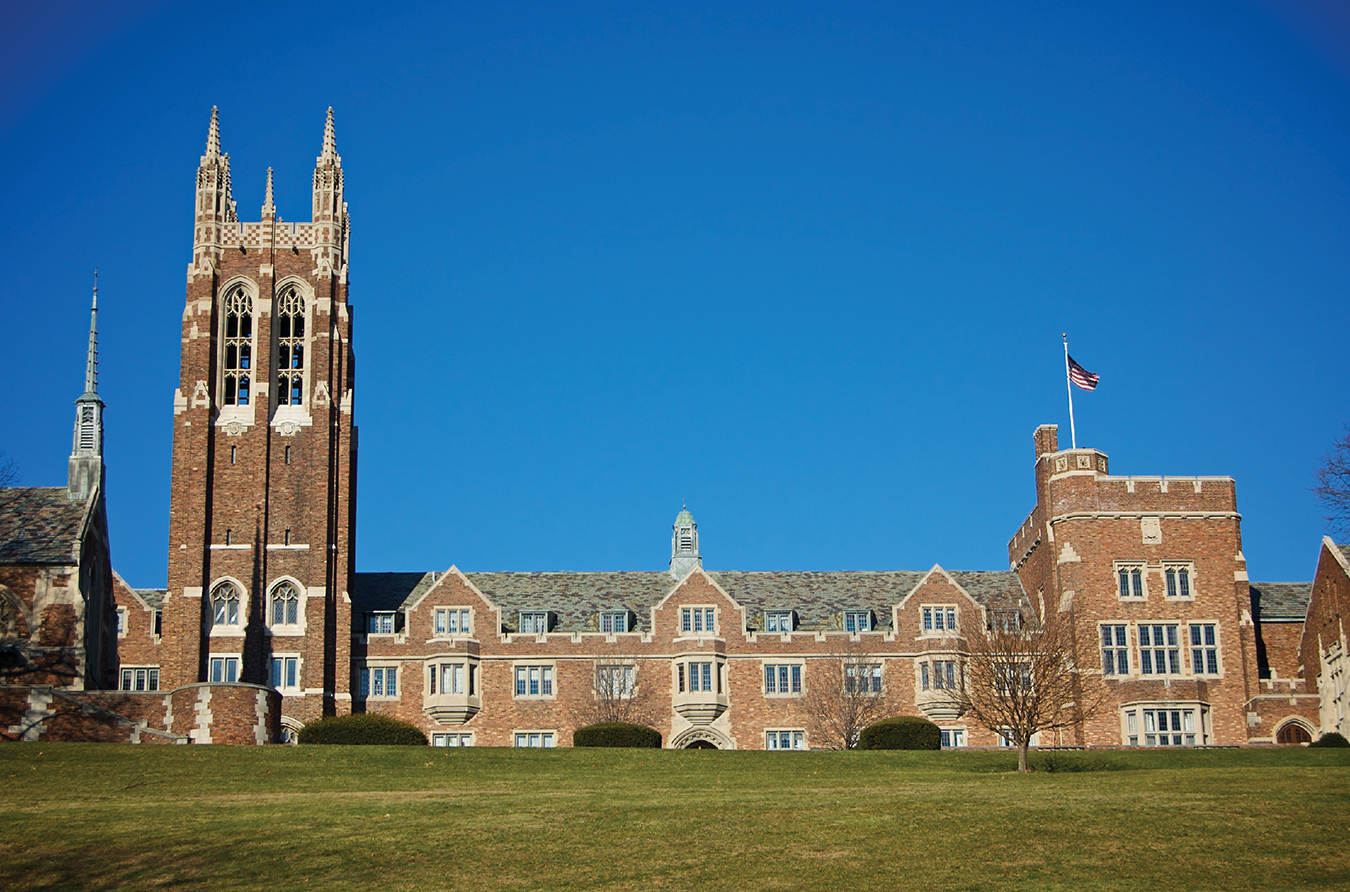 |
| Credit: Benjamin Golub |
Colgate Rochester Crozer Divinity School (CRCDS) in Rochester, New York, has announced plans to sell their hilltop campus to a company in the Rochester area. The sale of six buildings on 24 acres has been approved by the school’s board of trustees.
The divinity school will move into a new, as yet undetermined, location in the Rochester area by the 2017–18 academic year, coinciding with the school’s bicentennial. The school’s president, Marvin McMickle, cites changing trends in theological education as reasons for the move — trends that suggest that a smaller, more flexible, more affordable space is preferable to a larger campus with landmark structures. “This offer will provide us with the resources necessary to establish CRCDS in a new location that will meet our needs and the needs of our strategic plan going forward,” McMickle says.
In its antecedents, Colgate Rochester Crozer Divinity School is the oldest Baptist seminary in the United States, the product of a merger of Colgate (founded 1817) and Rochester (founded 1850) seminaries, which came together in 1928. A theological institute for women, the Baptist Missionary Training School, joined the institution in 1961, and a fourth school, Crozer Theological Seminary (the alma mater of Martin Luther King Jr.), joined in 1970.
Arthur Turner Training School to reopen
The Arthur Turner Training School of the Anglican Diocese of the Arctic is reopening after nine years. The school, which primarily trains indigenous Arctic people to become Anglican ministers, will operate out of St. Jude’s Cathedral in Iqaluit, Nunavut.
 |
St. Jude's Cathedral is in the capital of Nunavut, Canada's newest, largest, northernmost, and least populous territory.
Credit: Joseph Royal |
The school originally opened in 1970 in Pangnirtung, which was then in the Northwest Territories. After the harsh climate rapidly weathered the school’s buildings, making them unfit for occupation, the school ceased operations in 2007. The diocese’s St. Jude’s Cathedral could not provide a home for the school at the time, because it burned down two years before.
But the cathedral was rebuilt. When the new, igloo-shaped St. Jude’s reopened in 2012, the diocese began planning to reopen the training school. Finding financial resources proved difficult until the school received $50,000 in 2014 from the Indian Residential Schools Settlement agreement.
The school is reopening this fall featuring a curriculum taught in English and Inuktitut that will focus on indigenous approaches to theology.
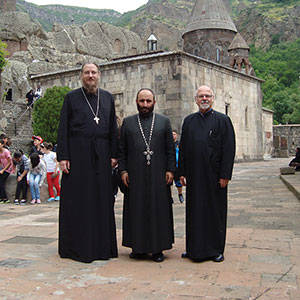 |
Father John Behr, dean of St. Vladimir's Seminary; the abbot of the Geghard Monastery; and Father Mardiros Chevian, dean of St. Nersess Seminary, at the Geghard Monastery in Armenia.
Credit: Michael Sabounjian |
St. Vladimir’s reaches agreement with Armenian seminary
St. Vladimir’s Orthodox Theological Seminary in Yonkers, New York, has signed a collaborative agreement with Gevorkian Theological Seminary in Vagharshapat, Armenia. Father John Behr, dean of St. Vladimir’s, and Father Mardiros Chevian, dean of St. Nersess Armenian Seminary in Armonk, New York, traveled to Armenia in June to meet with the Supreme Patriarch and Catholicos of All Armenians, His Holiness Karekin II, at the Mother See of Holy Etchmiadzin.
During the visit, Behr, representing St. Vladimir’s, signed an agreement with Gevorkian Theological Seminary that will provide for an exchange of students, faculty, courses, and library resources between the two schools. As part of the agreement, St. Nersess will serve as an intermediary between the seminaries.
The only Armenian seminary in the Western hemisphere, St. Nersess is not an accredited theological school but works closely with St. Vladimir’s to provide theological education for its students. Graduates of St. Nersess receive accredited master’s degrees through St. Vladimir’s and a diploma in Armenian Church Studies from St. Nersess.
Detroit seminary will purchase nearby land
Sacred Heart Major Seminary, the seminary of the Catholic Archdiocese of Detroit, has announced plans to purchase four plots of real estate from the city of Detroit. Funded by an anonymous donor, the purchase will extend the size of the campus to more than 42 acres. The price has not been disclosed.
The land to be purchased consists of an abandoned building and several empty lots. Msgr. Todd Lajiness, the seminary’s rector-president, says they will use the property to “increase parking, enhance our green space, and allow our programs to flourish.” The school will be adding additional secure parking on the campus; currently, they use athletic fields for overflow event parking.
Msgr. Lajiness says that the purchase will also benefit the city of Detroit, improving derelict property and “helping to stabilize local property values.”
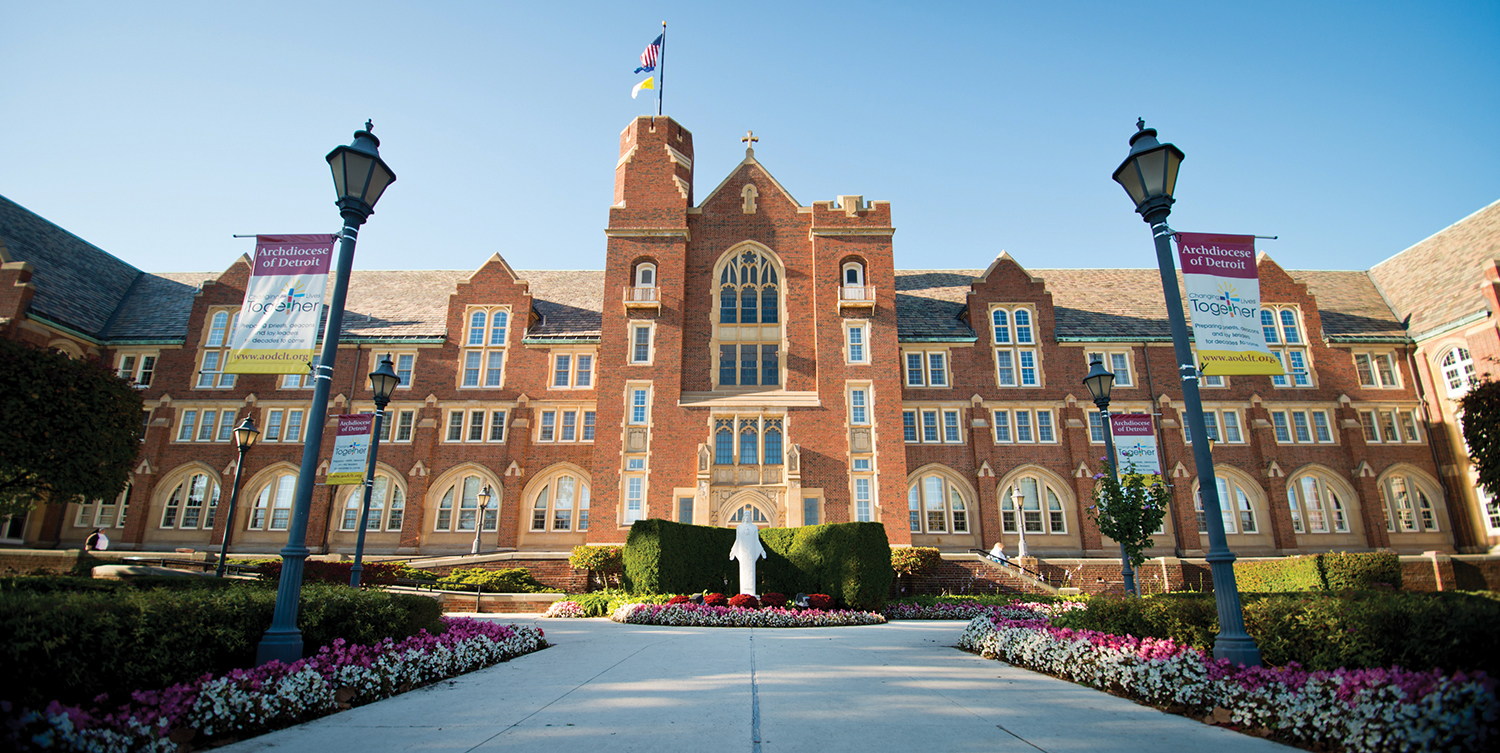 |
| Sacred Heart Major Seminary |
New degrees & programs
■ Christian Theological Seminary in Indianapolis has announced that it will offer the first Ph.D. in African American preaching and sacred rhetoric. The new program has been approved by the Commission on Accrediting of the Association of Theological Schools and will begin in January 2017.
The Rev. Frank A. Thomas, head of the seminary’s Academy of Preaching and Celebration, emphasized the unique role and responsibility of preaching in the African American tradition. To prepare students, the new program will train participants as “practitioner-scholars,” with the expectation that graduates will conduct scholarly work while serving in ministry.
■ Eden Theological Seminary in St. Louis has established the Walker Leadership Institute with a $1 million gift from George H. and Carol B. Walker.
The seminary is partnering with Webster University to develop the institute, which will offer a master of arts in community leadership and a fellows program for congregational leaders. George H. Walker is a former U.S. ambassador and a former chair of the board at Webster University; Carol B. Walker serves on the board of Eden Seminary.
The goals of the new institute are to bring business and faith leaders together and to teach business skills to religious leaders. The Walker Leadership Institute will be headed by the Rev. Steve Lawler, rector of St. Stephen’s Episcopal Church in Ferguson, Missouri. Lawler is an M.B.A. graduate of Washington University in St. Louis and formerly coordinated Washington University’s business and sustainability programs.
■ Western Theological Seminary in Holland, Michigan, has begun offering a 24-credit graduate certificate in disability and ministry.
The new certificate program is the latest in the seminary’s efforts to address disability in the frame of theology. In May, Western hosted the Summer Institute on Theology and Disability, and since 2007, Western has operated Friendship House, a residency program in which seminarians live communally with young adults who have cognitive disabilities.
■ Eastern Mennonite University in Harrisonburg, Virginia, recently awarded one of its graduates a joint master of divinity (from Eastern Mennonite Seminary) and master of business administration (from the university’s School of Graduate and Professional Studies).
Matt Stearn is the first at the school to complete the dual degree program, which began in spring 2014. In his divinity program, Stearn focused on cross-cultural and community mission, while in his business program, he focused on nonprofit entrepreneurial management. After graduation, Stearn was appointed executive director of Hampton Roads Ecumenical Lodging and Provision Inc. (HELP), a nonprofit organization in Hampton, Virginia, that provides shelter, food, financial assistance, and medical care to people in crisis.
Eastern Mennonite University designed the program for people like Stearn who are called to leadership in a business or nonprofit environment. According to the school, the dual program “combines the theological, biblical and pastoral training of a master of divinity with business and organizational leadership training.” At 97 semester hours, it allows completion of both degrees in less time than would be required to complete each program separately.
Changes at the top
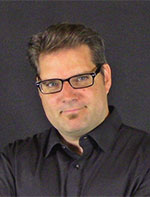 |
| Christopher Cone |
■ The board of trustees of Calvary University in Kansas City, Missouri, has named Dr. Christopher Cone as president of the school. He succeeds Dr. James L. Clark, president for seven years, who was named president emeritus.
Cone, whose term began July 1, most recently served as chief academic officer of Southern California Seminary in El Cajon, California. He was previously president of Tyndale Theological Seminary and Biblical Institute in Hurst, Texas. In addition, he has served in pastoral roles at San Diego Fellowship of the Bible and Tyndale Bible Church.
Cone is a graduate of Tyndale Biblical Institute, Scofield Graduate School, Regent University, Trinity School of Theology (Kerala, India), and the University of North Texas. He and his wife have two daughters.
Calvary University was formed by a 1961 merger between Kansas City Bible College (founded in 1932) and Midwest Bible College (founded in 1938). In 1987, Citadel Bible College of Ozark, Arkansas, merged into the institution. Until earlier this year, it was known as Calvary Bible College and Theological Seminary.
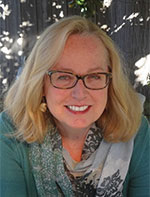 |
| Elaine A. Heath |
■ Duke University President Richard H. Brodhead and Provost Sally Kornbluth have named the Rev. Elaine A. Heath as dean of Duke Divinity School. She succeeds Dr. Ellen F. Davis, who served as interim dean for one year. The previous dean, Dr. Richard B. Hays, stepped down in 2015 after five years at the helm to undergo treatment for pancreatic cancer. In April 2016, Hays announced that his cancer is in remission.
At the time of her appointment, Heath was McCreless Professor of Evangelism at Southern Methodist University’s Perkins School of Theology in Dallas. Prior to joining the Perkins faculty in 2005, Heath served as the director of Ashland Theological Seminary’s doctor of ministry program. She also co-founded the Missional Wisdom Foundation, a ministry that helps clergy and lay people live in intentional communities based on United Methodist membership vows.
Heath is an ordained elder in the United Methodist Church and a graduate of Oakland University, Ashland Theological Seminary, and Duquesne University. She and her husband, Randall, have two grown daughters.
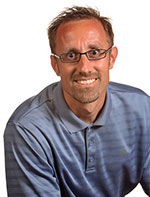 |
| Brent Peterson |
■ The Rev. Brent Peterson has been named dean of the School of Theology and Christian Ministries at Northwest Nazarene University in Nampa, Idaho. He succeeds the Rev. Mark Maddix, who departed to become dean of the School of Theology and Christian Ministry at Point Loma Nazarene University in San Diego.
Peterson has served as associate professor of theology at Northwest Nazarene University since 2007. He previously served in pastoral roles at the First Church of the Nazarene in Kansas City and at Chicago Northside Church of the Nazarene.
Peterson is a graduate of Northwest Nazarene University, Nazarene Theological Seminary, and Garrett-Evangelical Theological Seminary. He and his wife, Anne, have three children.
Also: Joel K. Pearsall, interim president of Northwest Nazarene University, has been named president for a four-year term.
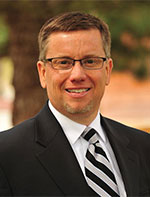 |
| Mark A. Maddix |
■ The Rev. Mark A. Maddix has been named professor of practical theology and dean of the School of Theology and Christian Ministry at Point Loma Nazarene University in San Diego. He succeeds Dr. Ron Benefiel, dean from 2011 to 2015, who stepped down to become lead consultant for mission resources and pastoral relations in the school’s Center for Pastoral Leadership.
For 14 years, Maddix served as a member of the faculty of Northwest Nazarene University in Nampa, Idaho, where he was most recently dean of the School of Theology and Christian Ministry. He previously served on the faculty of Nazarene Bible College in Colorado Springs, Colorado.
Maddix is a graduate of Asbury College, Asbury Theological Seminary, and Trinity Evangelical Divinity School. He and his wife, Sherri, have two grown children.
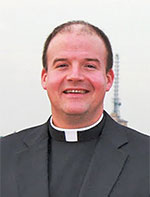 |
| Peter C. Harman |
■ Father Peter C. Harman has been named 23rd rector of the Pontifical North American College in Rome. He succeeds Father James Checchio, rector since 2006, who earlier this year was named bishop of Metuchen, New Jersey.
Harman was previously director of pastoral formation at the North American College and served as an adjunct instructor at the Gregorian University, also in Rome. From 2008 to 2013, he was rector of the Cathedral of the Immaculate Conception in his home diocese of Springfield, Illinois.
Father Harman is a graduate of Saint Meinrad College Seminary, North American College, and the Catholic University of America. He was ordained in Springfield in 1999.
The Pontifical North American College, which is under the authority of the U.S. Conference of Catholic Bishops, is governed by a board that includes one bishop from each of 14 U.S. regions. It provides pastoral, spiritual, and human formation for seminarians from across the United States and Australia; these seminarians receive their academic formation at the Gregorian University, the University of St. Thomas Aquinas, or one of the other Catholic educational institutions in Rome.
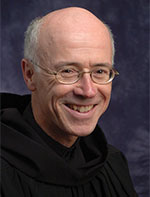 |
| Dale Launderville |
■ Benedictine Father Dale Launderville has been appointed dean of Saint John’s University School of Theology and Seminary in Collegeville, Minnesota. He succeeds Dr. William Cahoy, dean from 1999 to 2015, who has returned to the faculty.
A graduate of Saint John’s University and The Catholic University of America, Father Launderville became a professed monk of the Order of Saint Benedict in 1975 and was ordained to the priesthood in 1979. He was a member of Saint John’s faculty of theology from 1981 to 1982 and rejoined the faculty in 1985, serving as dean of the School of Theology from 1989 to 1999 and rector of the seminary from 1992 to 1997. Since then he has served Saint John’s in a number of roles, including chair of the Department of Theology.
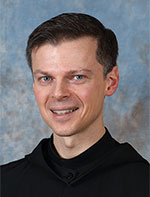 |
| Edward Michael Mazich |
■ In 2015, Benedictine Father Edward Michael Mazich was named 12th rector of Saint Vincent Seminary in Latrobe, Pennsylvania. He succeeded Father Timothy Whalen, rector from 2012 to 2013, who was appointed pastor of St. Mary of the Assumption Parish in Glenshaw, Pennsylvania. The announcement was made by Archabbot Douglas R. Nowicki, who in his role as head of Saint Vincent Archabbey also serves as chancellor of the seminary.
In 1998, Mazich professed his solemn monastic vows at Saint Vincent Archabbey Basilica, and three years later, he was ordained to the priesthood there. He has served on the Saint Vincent Seminary faculty since 2007, and during that time, he served as director of solemnly professed Benedictine and other religious seminarians, assistant director of human formation, and novice master of the monastic community.
He is a graduate of Pennsylvania State University, St. Vincent Seminary, and the University of Oxford. Father Mazich also holds licentiates from the Pontifical Biblical Institute and the Gregorian University in Rome.
Saint Vincent Seminary is a ministry of Saint Vincent Archabbey, the oldest Benedictine monastery in the United States, which was founded in 1846. The seminary was established in 1855 and chartered by the Pennsylvania legislature in 1870. Today its students include candidates for priesthood and permanent diaconate, as well as lay men and women pursuing graduate degrees and continuing education.
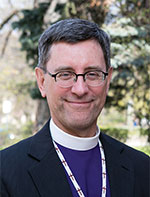 |
| Stephen Andrews |
■ The board of trustees of Wycliffe College at the University of Toronto has named the Right Rev. Stephen Andrews as principal of the school. He succeeds Bishop Peter Mason, who has led the school on an interim basis since 2015, when the Rev. George Sumner, principal for 16 years, was elected bishop of the Episcopal Diocese of Dallas.
At the time of his appointment, Andrews was bishop of the Anglican Diocese of Algoma, which is based in Sault Ste. Marie, Ontario. He previously served as president, provost, and vice-chancellor of Thorneloe University, an Anglican school that operates in federation with Laurentian University in Sudbury, Ontario. Prior to that, he served as dean of the Diocese of Saskatchewan and principal of the James Settee College for Ministry in Prince Albert, Saskatchewan.
Andrews is a graduate of the University of Colorado, Regent College, Wycliffe College, and Cambridge University. He and his wife, Fawna, have two daughters.
News summaries by Shannon Beaudry.